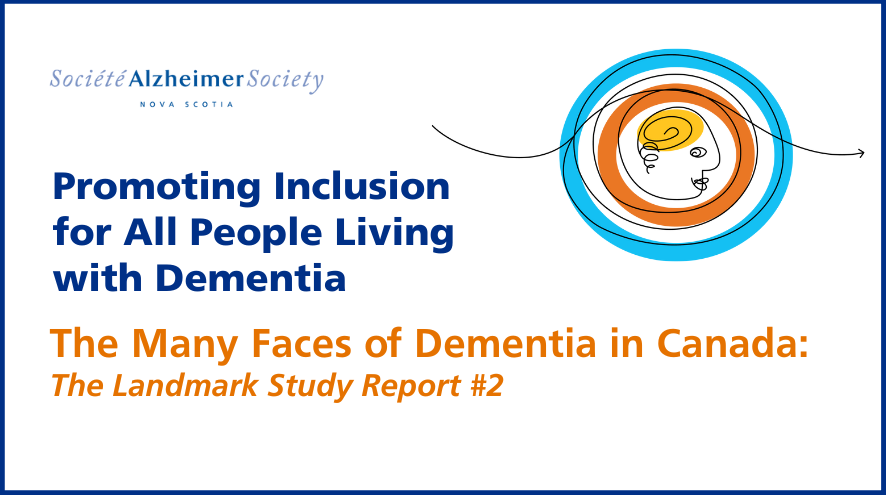Promoting Inclusion for All People Living with Dementia: The Many Faces of Dementia in Canada
Learn more about promoting including for all people living with dementia.

In January 2024, the Alzheimer Society of Canada released the second volume of the Landmark Study, The Many Faces of Dementia in Canada.
Over the past year we have been sharing education summaries on each Chapter. You have had the opportunity to learn more about this study, what it means for Nova Scotians, and what resources are available to help. We have shared local statistics, identified resources, and heard from Nova Scotians about ways in which cultures and social identities are related to experiences on the dementia journey.
Today we’re talking about Chapter 6, Promoting Inclusion for All People Living with Dementia (read the chapter here). This chapter acknowledges that the study is limited by Canadian population data currently available and trends in dementia. The chapter provides a brief overview of topics covered including and Indigeneity, ethnicity, sex and age. The report acknowledges that diversity of dementia does not stop with these communities and identities. There is much more that needs to be done, and can be done, to be more broadly inclusive for those at increased risk of experiencing dementia. Some of these at-risk communities in Nova Scotia include Acadian/French speaking communities, and members of the 2SLGBTQ+ community.
Pierre Roisné, Executive Director, Réseau Santé Nouvelle-Écosse, is concerned about the well being of people living with dementia in minority language environments. More research and supports are needed he says:
"L'isolement est à fois un facteur et une conséquence des troubles neurocognitifs. Or la perte de la langue seconde accroît l'isolement des personnes acadiennes et francophones atteintes d’un trouble neurocognitif, et vivant en situation minoritaire. Sans la mise en place d'une offre structurée et pérenne de services en français, ces personnes sont doublement affectées et se retrouvent dans un isolement complet, ne pouvant se faire comprendre et ne pouvant être comprise."
"Isolation is both a factor and a consequence of neurocognitive disorders. The loss of a second language increases the isolation of Acadian and francophone people with neurocognitive disorders and living in a minority situation. Without a structured, long-term offer of services in French, these people are doubly affected, and find themselves in complete isolation, unable to make themselves understood or to be understood."
Dan McKay, Elderberries Board Member and community advocate, echoes the need for additional research and supports for the 2SLGBTQ+ community. Dan calls for the need to reflect on the differences between 2SLGBTQ+ and straight healthcare, to explore terminology, to listen to healthcare hopes and concerns as the LGBTQ2S+ community ages and to understand the rights to chosen families. He is concerned about the dire effects of “going back in the closet” when someone enters Long Term Care, and the special care needed to support someone when memories about their identity change from day to day with dementia.
Chapter 6 acknowledges the need for increased dementia research and supports for 2SLGBTQI+ communities, for people with intellectual and developmental disabilities, for people who have been incarcerated, and for people who are experiencing homeless and addictions. Learning about the intersections of race, ethnicity, sex, gender and dementia, and the impact of colonization are important first steps; but it is just a start to how we must work to address issues related to diversity and dementia in Canada.
Additional resources:
- Turning up the Volume on 2SLGBTQIA+ needs in the Dementia Space (Alzheimer Society of Canada) (VIDEO)
- Egale
- Bibliothèque nationale des ressources (Société Alzheimer du Canada)
- Reseau Santé
- Dementia Dialogue - Francophone Episodes (PODCAST)
This is the last in our blog series on Landmark 2. Please feel free to have as look at posts you may have missed here. We look forward to seeing the Landmark 3 report in 2025, covering the economic impacts of dementia in Canada.
If you see yourself in this report, or are a community organization or healthcare provider and have suggestions on how we can better support you and your community, we invite you to contact us by email at alzheimer@asns.ca or phone at 1-800-611-6345.
